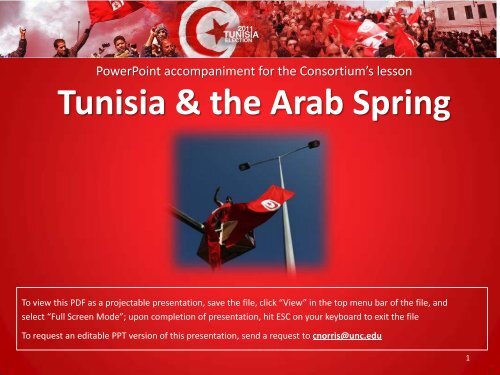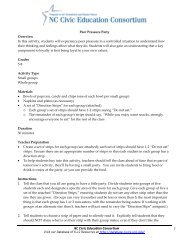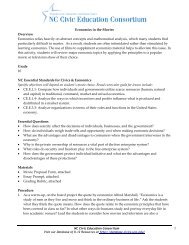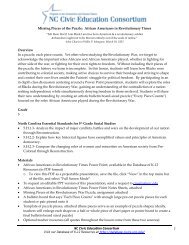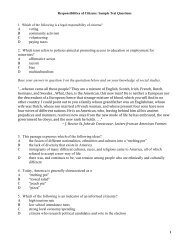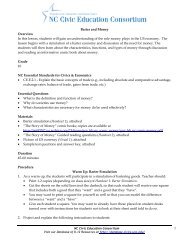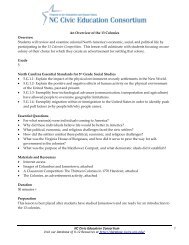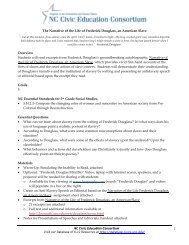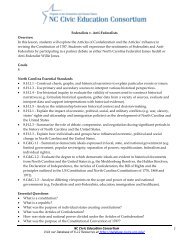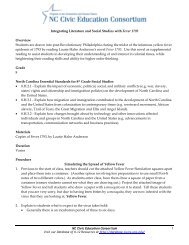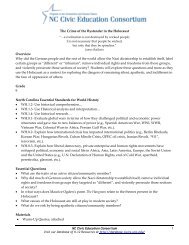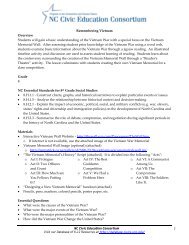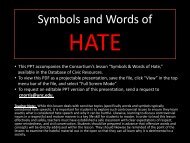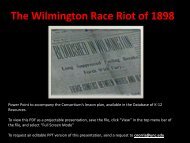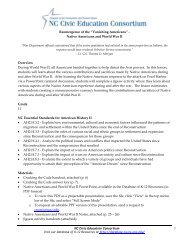Tunisia & the Arab Spring
Tunisia & the Arab Spring
Tunisia & the Arab Spring
Create successful ePaper yourself
Turn your PDF publications into a flip-book with our unique Google optimized e-Paper software.
PowerPoint accompaniment for <strong>the</strong> Consortium’s lesson<br />
<strong>Tunisia</strong> & <strong>the</strong> <strong>Arab</strong> <strong>Spring</strong><br />
To view this PDF as a projectable presentation, save <strong>the</strong> file, click “View” in <strong>the</strong> top menu bar of <strong>the</strong> file, and<br />
select “Full Screen Mode”; upon completion of presentation, hit ESC on your keyboard to exit <strong>the</strong> file<br />
To request an editable PPT version of this presentation, send a request to cnorris@unc.edu<br />
1
Freedom<br />
• What do you think of when you hear <strong>the</strong> word<br />
“freedom”<br />
• What actions do you associate with<br />
“freedom”<br />
• What makes a country “free”<br />
• What countries do you associate with<br />
“freedom” Why<br />
• What countries aren’t free Why<br />
3
Cartoon #1<br />
4
Cartoon #2<br />
5
Cartoon #3<br />
6
Cartoon #4<br />
The text on <strong>the</strong> sign says, "Peaceful protest<br />
creates change", while <strong>the</strong> text on <strong>the</strong> bloody<br />
sword says "Terrorism creates change".<br />
7
<strong>Tunisia</strong>: An Overview<br />
• The smallest North African State: slightly<br />
larger than Georgia<br />
• Population: 10,629,186<br />
– Age Breakdown:<br />
– 0-14 years: 23.2%<br />
– 15-64 years: 69.3%<br />
– 65 years and over: 7.5%<br />
8
• Unemployment Rate:<br />
<strong>Tunisia</strong>: An Overview<br />
– Officially 14%, but believed to be much higher<br />
– University graduates are chronically unemployed<br />
• 25% to 50% of recent college graduates may be unemployed, with<br />
graduates in agriculture having <strong>the</strong> worst prospects, with up to a 70%<br />
unemployment rate<br />
• Ethnic Groups:<br />
– 98% <strong>Arab</strong>, 1% European, 1% Jewish & o<strong>the</strong>r<br />
• Religion:<br />
– 98% Muslim, 1% Christian, 1% Jewish and o<strong>the</strong>r<br />
• Languages:<br />
– <strong>Arab</strong>ic and French<br />
9
<strong>Tunisia</strong>: An Overview<br />
• Urban population:<br />
– 67% of total population<br />
• Literacy Rate:<br />
– definition: age 15 and over can<br />
read and write<br />
– total population: 74.3%<br />
• Tunis is capital and largest city<br />
• <strong>Tunisia</strong> has a diverse economy,<br />
with important agricultural,<br />
mining, tourism, and<br />
manufacturing sectors.<br />
10
<strong>Tunisia</strong>’s Government<br />
• Obtained independence from<br />
France on March 20, 1956<br />
• One of <strong>the</strong> more socially<br />
liberal <strong>Arab</strong> governments<br />
• Since independence <strong>Tunisia</strong><br />
has only had two presidents:<br />
– Habib Bourguiba (1956 – 1987)<br />
– Zine El Abidine Ben Ali (1987 –<br />
2011)<br />
• What does <strong>the</strong> above fact tell<br />
you about <strong>the</strong> nature of<br />
<strong>Tunisia</strong>’s government<br />
11
<strong>Tunisia</strong>’s Government<br />
• Officially a constitutional republic<br />
– President as chief-of-state<br />
– Prime Minister as head of government<br />
(appointed by President)<br />
– Bicameral Parliament:<br />
• Chamber of Deputies<br />
• Chamber of Advisors<br />
• Multi-party system, but Constitutional Democratic Rally (RCD)<br />
dominated <strong>the</strong> government.<br />
– Won 84% of <strong>the</strong> seats in Chamber of Deputies in 2009 Election<br />
• Political Reforms since 1987<br />
– Abolished life-term presidencies, but <strong>the</strong>re are no term limits<br />
– Opened up parliament to opposition parties<br />
– 8 recognized political parties<br />
• Women hold 27% of <strong>the</strong> seats in <strong>the</strong> Chamber of Deputies<br />
RCD Poster<br />
– A higher % than <strong>the</strong> US Congress<br />
12
Voting in <strong>Tunisia</strong><br />
• Elections held every 5 to 6<br />
years<br />
• Suffrage is universal at 18,<br />
except for<br />
– Active military<br />
– Internal security forces<br />
• Comparing past US elections<br />
to <strong>Tunisia</strong>’s most recent<br />
presidential election, what<br />
does Ben Ali’s margin of<br />
victory tell you about<br />
elections in <strong>Tunisia</strong><br />
Election Year Candidates % of votes<br />
2008 Barack Obama 52.9%<br />
John McCain 45.7%<br />
2004 George W. Bush 50.7%<br />
John Kerry 48.3%<br />
1964 Lyndon Johnson 61.1%<br />
Barry Goldwater 38.5%<br />
13
Fall of Ben Ali<br />
• In January 2011, Ben Ali fled <strong>Tunisia</strong> after a series of<br />
protests throughout <strong>the</strong> country.<br />
– What do you think prompted <strong>Tunisia</strong>ns to demand change<br />
– What would it take for you to get out marching in <strong>the</strong> streets<br />
14
Wikileaks<br />
• An international organization that<br />
publishes submissions of private,<br />
secret, and classified media.<br />
• In early 2010 <strong>the</strong>y began publishing<br />
US diplomatic cables.<br />
• According to Wikipedia, “<strong>the</strong> cables<br />
contain diplomatic analysis from<br />
world leaders, and <strong>the</strong> diplomats'<br />
assessment of host countries and<br />
<strong>the</strong>ir officials.”<br />
15
Wikileaks<br />
Read <strong>the</strong> “<strong>Tunisia</strong>n Diplomatic<br />
Cable” handout in your groups<br />
and answer <strong>the</strong> attached<br />
questions.<br />
16
The <strong>Arab</strong> <strong>Spring</strong> After <strong>Tunisia</strong><br />
As of October 2011, 17 nations have seen some type of minor and<br />
major protests, civil uprisings or revolutions.<br />
17
The <strong>Arab</strong> <strong>Spring</strong> After <strong>Tunisia</strong><br />
• Shortly after Ben Ali fled, peaceful protests<br />
forced Hosni Mubarak – Egypt’s leader –to<br />
step down after 30 years in power.<br />
– He is currently on trial.<br />
• In Libya, rebels rose up against Muammar<br />
Gaddafi and a bloody civil war – which<br />
involved assistance by <strong>the</strong> US – ensured.<br />
Gaddafi was overthrown and killed.<br />
18
The <strong>Arab</strong> <strong>Spring</strong> After <strong>Tunisia</strong><br />
• As of November 2011, Bashar al-Assad –<br />
Syria’s Leader – is violently suppressing<br />
protests and uprisings in his country.<br />
• In Saudi <strong>Arab</strong>ia, women are posting videos of<br />
<strong>the</strong>mselves driving (which is forbidden in<br />
Saudi <strong>Arab</strong>ia) on <strong>the</strong> internet. The Saudi King<br />
recently granted women <strong>the</strong> right to vote in<br />
<strong>the</strong> next elections.<br />
19
<strong>Tunisia</strong>’s Elections<br />
• In October 2011, <strong>Tunisia</strong>ns went to <strong>the</strong> polls, under <strong>the</strong><br />
watchful eye of international election observers, for <strong>the</strong><br />
first truly democratic election in over 50 years.<br />
• The elections were mostly peaceful. Only a handful of<br />
people protested.<br />
• Many observers hailed it as a seismic shift in Middle<br />
Eastern politics and as a model for o<strong>the</strong>r countries<br />
participating in <strong>the</strong> <strong>Arab</strong> <strong>Spring</strong>.<br />
• A region that has long been dominated by strongmen, had<br />
a fair and free election.<br />
20
<strong>Tunisia</strong>’s Election Results<br />
• This election was to determine<br />
an assembly of people to write<br />
<strong>the</strong> new Constitution.<br />
• After <strong>the</strong> votes were counted,<br />
Ennahda, and Islamist party,<br />
won with 41% of <strong>the</strong> vote.<br />
– Islamist parties believe that<br />
Islam is a religion and a political<br />
system<br />
– They can range from extremely<br />
oppressive to moderate<br />
– Ennadha is considered<br />
moderate.<br />
21
<strong>Tunisia</strong>’s Election Results<br />
• Some <strong>Tunisia</strong>ns are nervous<br />
because <strong>the</strong>y fear a<br />
repressive religious society<br />
• Ennahda has attempted to<br />
assuage people’s fears by<br />
promising that:<br />
– Hijabs (female head cover) will<br />
not be required by law<br />
– Alcohol will not be banned<br />
– Non-Muslims will not be<br />
persecuted<br />
– Women will be allowed to<br />
vote and hold office<br />
Tourism is a major<br />
industry. A repressive<br />
religious regime would<br />
hurt <strong>the</strong> industry.<br />
22
The Overblown Islamist Threat<br />
• Read <strong>the</strong> article and answer <strong>the</strong> following questions<br />
in your pairs:<br />
– Why were Islamist parties popular under autocratic<br />
regimes<br />
– How does <strong>the</strong> younger generation of <strong>Arab</strong>s affect <strong>the</strong><br />
power of <strong>the</strong> Islamist parties<br />
– What has happened when Islamist parties have been<br />
included in government<br />
– Do we have anything similar in <strong>the</strong> United States<br />
23
Sample Tweet<br />
24


